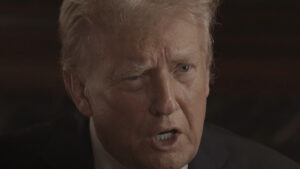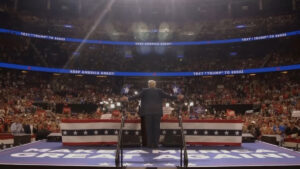Vindicating Trump (2024) review
Dir. Dinesh D’Souza, Debbie D’Souza, and Bruce Schooley
By: Steve Pulaski
Rating: ½★
By now, you should know what you’re getting with each passing Dinesh D’Souza documentary, whether you’re a fan or not. If you’re a fan, you’ll be delighted by the fact that somebody else not only shares your conservative views, but believes in them ardently enough to commission yet another documentary showcasing them despite each subsequent one’s impact and relevance. If you’re on the polar opposite side of the political aisle, and dislike D’Souza, his baseless arguments and ostensible aversion to facts has become something you’ve grown accustomed to ignoring over the years.
Regardless, his latest doc, Vindicating Trump, is out in theaters a little over a month before what will undoubtedly not be a very contentious election nor spawn weeks, or even months, of political and social turmoil, regardless of outcome. As its title suggests, this is a film that looks to do the impossible: paint Donald Trump as a sympathetic individual. Specifically, D’Souza examines the buzzword of “tyrant” that’s been tossed around to describe the polarizing former president. Using his own lack of bias along with that of Lara Trump and Trump’s lawyer Alina Habba, he seeks to convince audiences that the real tyrants are of course the Democrats, the villains of each and every one of his films dating back to the runaway hit 2016: Obama’s America.
I’ve not been particularly shy about my contempt for Trump in the past, leaving some to maybe wonder why I’d even bother seeing a film like Vindicating Trump in the first place. Simply put, I wanted to see how D’Souza would contort himself to usher in a public defense for the president, who pardoned him for his illegal Senate financial contributions. This is now D’Souza’s fourth film to revolve around Donald Trump and praise him without reservations, proving that cinematic brown-nosing is a thing that doesn’t lead to quality nor substantive works.

Through endless narration, D’Souza waxes glowingly about Trump, at one point even making the claim that Americans don’t appreciate how good of “a comedian” Trump is at political rallies or debates. Lara, Trump’s daughter, talks about how he’s a “family-first” man, so much so that he put his entire family, including his nephew and disabled son, in the political crosshairs when his family-first actions compelled him to run for president on a platform of incendiary and mostly false statements. She also adds that despite his busy schedule, he still makes time to show up to his grandkids’ schools for things like “Grandparent’s Day,” regardless of the fact that he’s running a presidential campaign and facing felony charges.
Because, you know, all of these things truly matter when electing the President of the United States. Last month, we got a biopic on the life of Ronald Reagan, which conveniently dodged the president’s low-points in favor of a hagiographic portrait of the actor-turned-politician. It’s much easier to focus on the menial moments in both Reagan and Trump’s lives than to remember that both men hold the dubious honor of having the most indictments across their political cabinets.
The centerpiece of the film is a face-to-face interview D’Souza conducts with Trump, which took place a week after the July 13th assassination attempt. This is where D’Souza really fails as an interviewer, assuming he was trying to be a fair and captivating one in the first place. Instead of D’Souza using this as an opportunity to ask Trump why someone would take a shot at him, or how he felt when he got a chance to compose himself and truly come to grips with the fact that his life was nearly cut short, he instead uses the opportunity to villainize Democrats and backslap the man who absolved him of being a felon himself.

Equally loathsome are a series of dramatizations revolving around Democratic campaigners and constituents, big and small, who are portrayed as closet racists and shortsighted homophobes as they grapple with Trump’s initial entry into the 2016 presidential election race and subsequent rise. These scenes are absolutely atrocious not only for the brazen stereotypes they convey, but for the awful dialog they force us to endure. An LGBTQ+ woman suggests her Black coworker has the mindset of a slave. That same Black coworker asks if trying to indict Trump before the election constitutes as election interference. “It’s not interference if we do it,” another one responds.
Who the hell are these people? What purpose do they serve other than serving the wish-fulfilment fantasies of Republican voters and D’Souza himself, who love seeing Democrats behave as buffoons? For a documentary to include these kinds of hokey sketches that make Saturday Night Live parodies appear as high-art is dishonest.
However, the back-half of the film involves D’Souza talking to several more unnamed nobodies, who tell him how easy it is to “buy ballots,” obtain a list of names of those who have not voted in elections past, and then use their signatures on fraudulent ballots that then can be snuck into polling places. This process is shown through sketchy archival footage and other dramatized “reenactments.” You’re silly if you think any statistics or sources will be provided. Just as silly as you are to spend money to see Vindicating Trump. Even if you’re a fan of the man, and will proudly vote for him in next month’s election per your right to do so, you deserve better hagiography than this, which seems so proud of its lack of substance and facts that it would fit right in at any Republican-sponsored event.
NOTE: I got to chat with Dinesh D’Souza about Vindicating Trump, his early life in America, and his previous film, 2000 Mules, being disavowed by its studio, Salem Media. Take a listen to that interview below!
My review of 2016: Obama’s America
My review of America: Imagine the World Without Her
My review of Hillary’s America: The Secret History of the Democratic Party
My review of Death of a Nation
Directed by: Dinesh D’Souza, Debbie D’Souza, and Bruce Schooley.
About Steve Pulaski
Steve Pulaski has been reviewing movies since 2009 for a barrage of different outlets. He graduated North Central College in 2018 and currently works as an on-air radio personality. He also hosts a weekly movie podcast called "Sleepless with Steve," dedicated to film and the film industry, on his YouTube channel. In addition to writing, he's a die-hard Chicago Bears fan and has two cats, appropriately named Siskel and Ebert!


